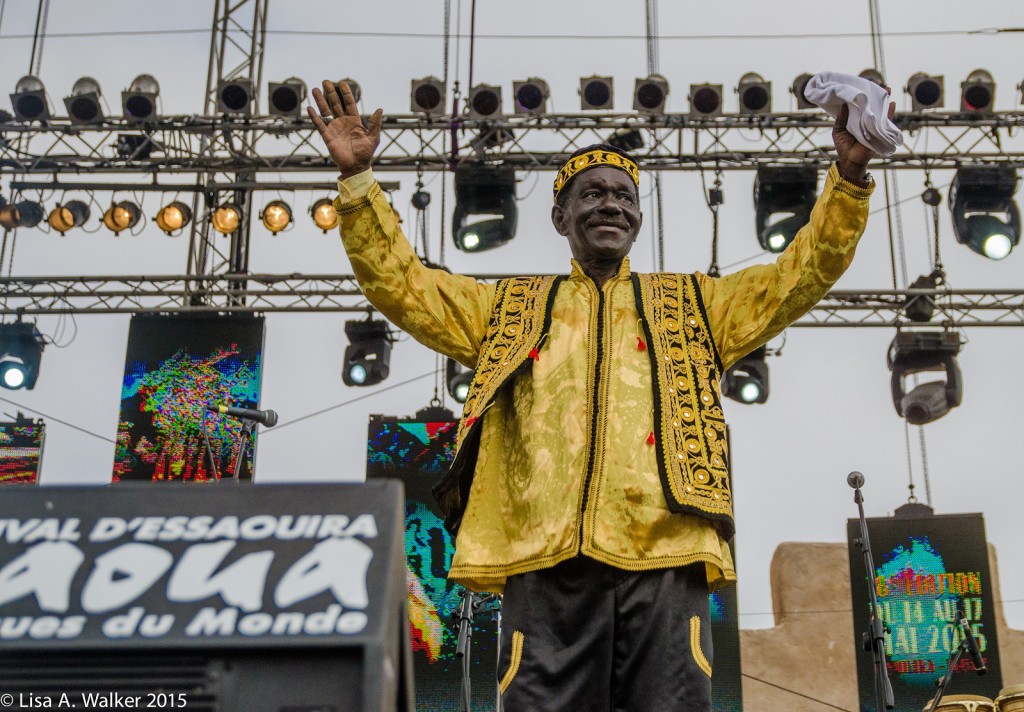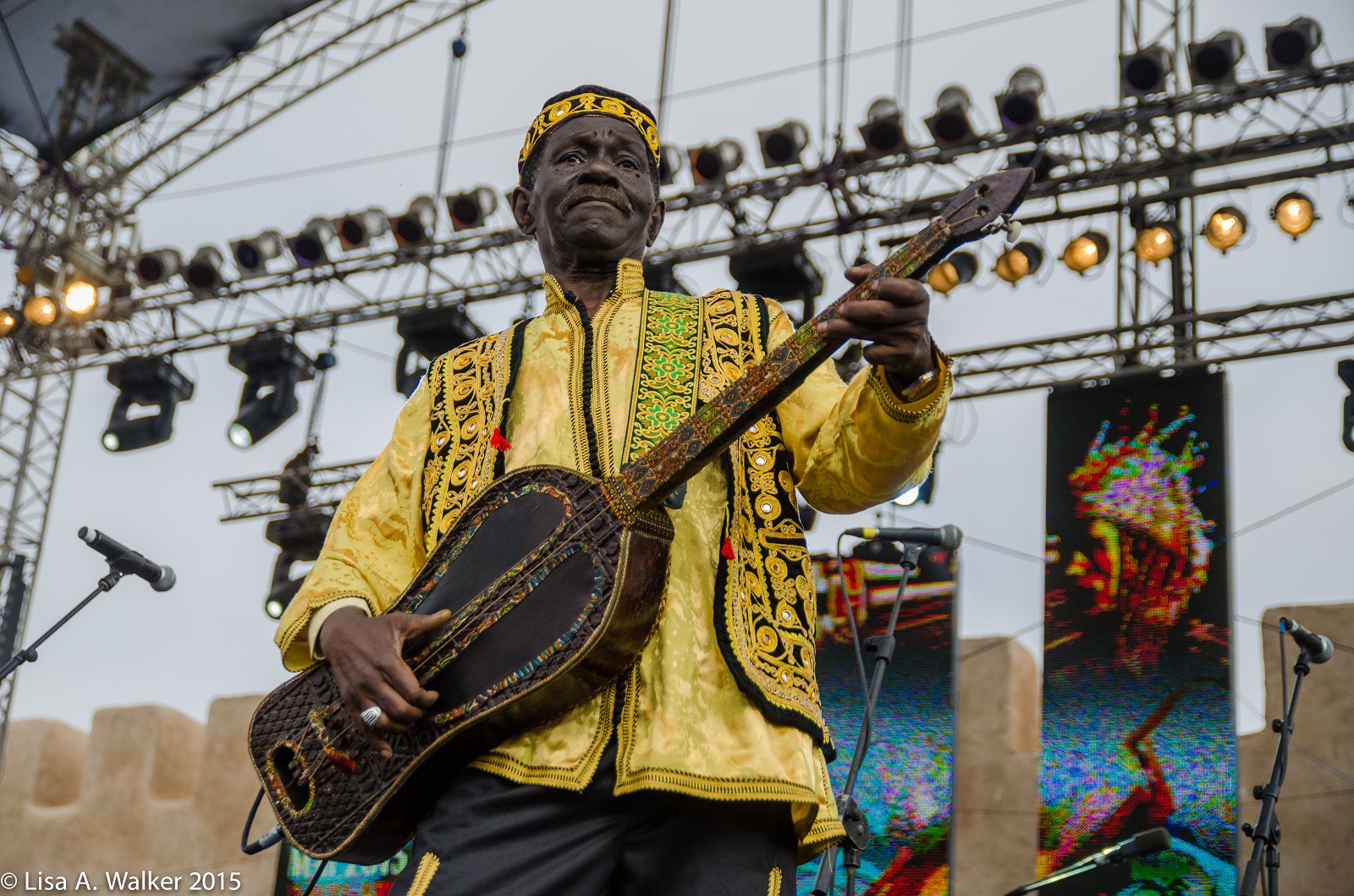Blog August 4, 2015
Moroccan Gnawa Master Mahmoud Guinea Dies
One of the great masters of Morocco’s Gnawa tradition, Maâlem Mahmoud Guinea, died Sun., Aug. 2, in his hometown of Essaouira after a long battle with prostate cancer. He was 65 years old.
Best known abroad for his collaborations with such Western musicians as Pharaoh Sanders, Peter Brötzmann and Carlos Santana, Guinea - sometimes known as Gania - was a maâlem: a recognized master of the Gnawa musical and spiritual tradition
Guinea was born in 1951 in the town of Essaouira on Morocco’s Atlantic Coast. In those days the town was still known by its colonial name, Mogador. Then, as now, it was one of the epicenters of Gnawa music and Mahmoud Guinea was born into one of the great Gnawa families, as the second son of Maâlem Boubker Guinea and A'isha Qabral, a moqaddema (a kind of mystic diviner) famous throughout Morocco.
The Gnawa tradition has always been tied to Morocco’s black community--many the descendants of slaves from Sub-Saharan Africa--and Guinea’s family was no exception: Both his parents could trace their ancestry back to Mali and his paternal grandfather had been sold into slavery in the Sahara.
The Guinea family’s connection to Gnawa music and tradition is particularly strong, and they are known as masters of the saouiri style endemic to Essaouira. In addition to Mahmoud Guinea, his brothers Mokhtar Guinea and Abdellah Guinea are also well-known maâlem and their sister Zaida carries on the family moqaddema tradition as well.
Mahmoud Guinea began playing the gimbri--the three-stringed box guitar played by all true Gnawa masters--at the age of 12, and by age 20 he was performing at the lila ceremonies that are at the heart of Gnawa spiritual life. He went on to great renown for his mastery of the difficult tagnaouite repertoire.
 His recording career was prolific, but not always well documented. He began recording in the late ‘60s/early ‘70s for a string of domestic labels, including Fikriphone, Tichkaphone and Fes Matic--mostly live recordings of lila ceremonies. In 1994 he recorded The Trance of Seven Colors for Bill Laswell’s Axiom Label, and teamed up in 1997 with German free-jazz saxophonist Peter Brötzmann and American drummer Hamid Drake to record The “Wels” Concert for the Okka Disc label. His most recent international recording was Marhaba, a 2015 release on the Border Community label that teamed Guinea with British electronica artists Floating Points and Holden.
But Guinea’s cross-cultural collaborations were best realized onstage, including concerts with the likes of Carlos Santana and jazz great Randy Weston, who has a longstanding affinity for Gnawa music. Guinea was especially known for his long-running affiliation with Essaouira’s annual Gnaoua World Music Festival, where he welcomed artists from all over the world for two decades. One of the festival’s signatures are the onstage musical fusions between the local maâlems and foreign artists, and some of Mahmoud Guinea’s most memorable performances included fusions with Will Calhoun, Issaka Sow, Aly Keita, Omar Sosa and Mauritanian singer Daby Touré.
His appearance at this year’s Gnaoua Festival in Essaouira was especially poignant. In the festival’s closing concert, Guinea took the main stage one last time for a fusion with Algerian percussionist Karim Ziad. Though he was visibly emaciated, his hometown crowd was solidly behind him, cheering wildly through what would become his last set. Throughout it all, Mahmoud Guinea smiled beatifically, transported by the music one last time.
Maâlem Mahmoud Guinea was laid to rest on Mon., Aug. 3, in Essaouira. His funeral was attended by the mayor of Essaouira, the king’s own representative, and a host of fellow artists, Gnawas and fans. King Mohammed VI also sent a message of condolence from Rabat, expressing “deep grief and great sorrow” and praising Guinea as a “virtuoso Maallem" and a “great pioneer” — honors that would’ve been unthinkable for a Gnawa musician just a generation ago. He is survived by his wife Malika, two sons, Hamza and Houssam and daughter Bouchra.
Photos by Lisa Walker
His recording career was prolific, but not always well documented. He began recording in the late ‘60s/early ‘70s for a string of domestic labels, including Fikriphone, Tichkaphone and Fes Matic--mostly live recordings of lila ceremonies. In 1994 he recorded The Trance of Seven Colors for Bill Laswell’s Axiom Label, and teamed up in 1997 with German free-jazz saxophonist Peter Brötzmann and American drummer Hamid Drake to record The “Wels” Concert for the Okka Disc label. His most recent international recording was Marhaba, a 2015 release on the Border Community label that teamed Guinea with British electronica artists Floating Points and Holden.
But Guinea’s cross-cultural collaborations were best realized onstage, including concerts with the likes of Carlos Santana and jazz great Randy Weston, who has a longstanding affinity for Gnawa music. Guinea was especially known for his long-running affiliation with Essaouira’s annual Gnaoua World Music Festival, where he welcomed artists from all over the world for two decades. One of the festival’s signatures are the onstage musical fusions between the local maâlems and foreign artists, and some of Mahmoud Guinea’s most memorable performances included fusions with Will Calhoun, Issaka Sow, Aly Keita, Omar Sosa and Mauritanian singer Daby Touré.
His appearance at this year’s Gnaoua Festival in Essaouira was especially poignant. In the festival’s closing concert, Guinea took the main stage one last time for a fusion with Algerian percussionist Karim Ziad. Though he was visibly emaciated, his hometown crowd was solidly behind him, cheering wildly through what would become his last set. Throughout it all, Mahmoud Guinea smiled beatifically, transported by the music one last time.
Maâlem Mahmoud Guinea was laid to rest on Mon., Aug. 3, in Essaouira. His funeral was attended by the mayor of Essaouira, the king’s own representative, and a host of fellow artists, Gnawas and fans. King Mohammed VI also sent a message of condolence from Rabat, expressing “deep grief and great sorrow” and praising Guinea as a “virtuoso Maallem" and a “great pioneer” — honors that would’ve been unthinkable for a Gnawa musician just a generation ago. He is survived by his wife Malika, two sons, Hamza and Houssam and daughter Bouchra.
Photos by Lisa Walker
 His recording career was prolific, but not always well documented. He began recording in the late ‘60s/early ‘70s for a string of domestic labels, including Fikriphone, Tichkaphone and Fes Matic--mostly live recordings of lila ceremonies. In 1994 he recorded The Trance of Seven Colors for Bill Laswell’s Axiom Label, and teamed up in 1997 with German free-jazz saxophonist Peter Brötzmann and American drummer Hamid Drake to record The “Wels” Concert for the Okka Disc label. His most recent international recording was Marhaba, a 2015 release on the Border Community label that teamed Guinea with British electronica artists Floating Points and Holden.
But Guinea’s cross-cultural collaborations were best realized onstage, including concerts with the likes of Carlos Santana and jazz great Randy Weston, who has a longstanding affinity for Gnawa music. Guinea was especially known for his long-running affiliation with Essaouira’s annual Gnaoua World Music Festival, where he welcomed artists from all over the world for two decades. One of the festival’s signatures are the onstage musical fusions between the local maâlems and foreign artists, and some of Mahmoud Guinea’s most memorable performances included fusions with Will Calhoun, Issaka Sow, Aly Keita, Omar Sosa and Mauritanian singer Daby Touré.
His appearance at this year’s Gnaoua Festival in Essaouira was especially poignant. In the festival’s closing concert, Guinea took the main stage one last time for a fusion with Algerian percussionist Karim Ziad. Though he was visibly emaciated, his hometown crowd was solidly behind him, cheering wildly through what would become his last set. Throughout it all, Mahmoud Guinea smiled beatifically, transported by the music one last time.
Maâlem Mahmoud Guinea was laid to rest on Mon., Aug. 3, in Essaouira. His funeral was attended by the mayor of Essaouira, the king’s own representative, and a host of fellow artists, Gnawas and fans. King Mohammed VI also sent a message of condolence from Rabat, expressing “deep grief and great sorrow” and praising Guinea as a “virtuoso Maallem" and a “great pioneer” — honors that would’ve been unthinkable for a Gnawa musician just a generation ago. He is survived by his wife Malika, two sons, Hamza and Houssam and daughter Bouchra.
Photos by Lisa Walker
His recording career was prolific, but not always well documented. He began recording in the late ‘60s/early ‘70s for a string of domestic labels, including Fikriphone, Tichkaphone and Fes Matic--mostly live recordings of lila ceremonies. In 1994 he recorded The Trance of Seven Colors for Bill Laswell’s Axiom Label, and teamed up in 1997 with German free-jazz saxophonist Peter Brötzmann and American drummer Hamid Drake to record The “Wels” Concert for the Okka Disc label. His most recent international recording was Marhaba, a 2015 release on the Border Community label that teamed Guinea with British electronica artists Floating Points and Holden.
But Guinea’s cross-cultural collaborations were best realized onstage, including concerts with the likes of Carlos Santana and jazz great Randy Weston, who has a longstanding affinity for Gnawa music. Guinea was especially known for his long-running affiliation with Essaouira’s annual Gnaoua World Music Festival, where he welcomed artists from all over the world for two decades. One of the festival’s signatures are the onstage musical fusions between the local maâlems and foreign artists, and some of Mahmoud Guinea’s most memorable performances included fusions with Will Calhoun, Issaka Sow, Aly Keita, Omar Sosa and Mauritanian singer Daby Touré.
His appearance at this year’s Gnaoua Festival in Essaouira was especially poignant. In the festival’s closing concert, Guinea took the main stage one last time for a fusion with Algerian percussionist Karim Ziad. Though he was visibly emaciated, his hometown crowd was solidly behind him, cheering wildly through what would become his last set. Throughout it all, Mahmoud Guinea smiled beatifically, transported by the music one last time.
Maâlem Mahmoud Guinea was laid to rest on Mon., Aug. 3, in Essaouira. His funeral was attended by the mayor of Essaouira, the king’s own representative, and a host of fellow artists, Gnawas and fans. King Mohammed VI also sent a message of condolence from Rabat, expressing “deep grief and great sorrow” and praising Guinea as a “virtuoso Maallem" and a “great pioneer” — honors that would’ve been unthinkable for a Gnawa musician just a generation ago. He is survived by his wife Malika, two sons, Hamza and Houssam and daughter Bouchra.
Photos by Lisa Walker








